8 dec 2018
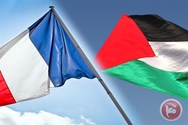
Palestine and France signed 10 cooperation agreements, on Friday, during a visit by Palestinian Prime Minister Rami Hamdallah to Paris and his meeting with his French counterpart, Edouard Philippe.
Palestinian Foreign Minister Riyad al-Malki, along with his French counterpart, Jean-Yves Le Drian, signed 10 cooperation agreements in education, budget, local governance, civil defense, environment, water, agriculture and developing the private sector.
Meanwhile, Hamdallah attended a joint press conference with Philippe, where he thanked France for its support for Palestine and its support for the two-state solution.
Hamdallah said, "As I expressed in our discussions with Prime Minister Philippe today, we are grateful for the French positions which demonstrate strong commitments to deepen and develop our partnership and cooperation and I would like to emphasize that this is also our commitment.”
He said that the meeting of the joint French-Palestinian ministerial committee in Paris is important for promoting cooperation between their two countries and its peoples.
Hamdallah said that French support was vital for developing the Palestinian economy and strengthening government institutions through capacity building, particularly in areas such as health, education, agricultural and water, among others.
“Our meeting today in Paris is a strong demonstration of the solidarity between the French and Palestinian peoples, as well as the tremendous opportunities for cooperation between us.”
Regarding the peace process, Hamdallah appreciated French efforts to bring peace to the Middle East and called for establishing an international group to revive the deadlocked peace process.
Hamdallah added, "I would like to emphasize the utmost importance of recognizing the independent Palestinian state on the 1967 borders with East Jerusalem as its capital. This recognition will help save the two-state solution and give hope and optimism to our Palestinian people.”
Palestinian Foreign Minister Riyad al-Malki, along with his French counterpart, Jean-Yves Le Drian, signed 10 cooperation agreements in education, budget, local governance, civil defense, environment, water, agriculture and developing the private sector.
Meanwhile, Hamdallah attended a joint press conference with Philippe, where he thanked France for its support for Palestine and its support for the two-state solution.
Hamdallah said, "As I expressed in our discussions with Prime Minister Philippe today, we are grateful for the French positions which demonstrate strong commitments to deepen and develop our partnership and cooperation and I would like to emphasize that this is also our commitment.”
He said that the meeting of the joint French-Palestinian ministerial committee in Paris is important for promoting cooperation between their two countries and its peoples.
Hamdallah said that French support was vital for developing the Palestinian economy and strengthening government institutions through capacity building, particularly in areas such as health, education, agricultural and water, among others.
“Our meeting today in Paris is a strong demonstration of the solidarity between the French and Palestinian peoples, as well as the tremendous opportunities for cooperation between us.”
Regarding the peace process, Hamdallah appreciated French efforts to bring peace to the Middle East and called for establishing an international group to revive the deadlocked peace process.
Hamdallah added, "I would like to emphasize the utmost importance of recognizing the independent Palestinian state on the 1967 borders with East Jerusalem as its capital. This recognition will help save the two-state solution and give hope and optimism to our Palestinian people.”
7 dec 2018

The State of Kuwait has provided $4.5 million to carry out important infrastructure projects and build a maternity center at al-Shifa Hospital in the Gaza Strip.
In press remarks, minister of public works and housing Mufid Hasayneh stated that his ministry had embarked on contacting several Arab and international parties to urge them to support reconstruction and infrastructure projects in Gaza and help alleviate the suffering of the population.
Hasayneh expressed his thanks to Kuwait and its Arab Economic Development Fund for the support they provide for the Palestinian people.
In press remarks, minister of public works and housing Mufid Hasayneh stated that his ministry had embarked on contacting several Arab and international parties to urge them to support reconstruction and infrastructure projects in Gaza and help alleviate the suffering of the population.
Hasayneh expressed his thanks to Kuwait and its Arab Economic Development Fund for the support they provide for the Palestinian people.

An Israeli military court approved the removal of the water supply network in Aqaba village in the northern Jordan Valley and turned down an objection filed a year ago by the local residents.
Chief of the village Sami Sadeq told a reporter for the Palestinian Information Center (PIC) that a lawyer hired by the residents told them that the Israeli court rejected the objection filed against the removal of the water network and sanctioned the Israeli occupation army’s decision to raze it at the pretext that it was set up with no license.
Sadeq said that the water network was deployed about two years ago in the village to serve the local residents, but later the Israeli army ordered its removal, adding that the case had been dealt with by an Israeli military court for about one year.
The local official affirmed that the village council and the residents would not give up and would try to extract a verdict against the removal of the water network from the Israeli high court of justice.
The water supply network is an internal system inside the village serving about 70 Palestinian homes.
The village of Aqaba is encircled by three Israeli army bases and its residents are exposed to repeated shooting incidents during military drills and exercises.
The Israeli army has already demolished several homes in the village and threaten to raze more others as well as its Mosque.
Chief of the village Sami Sadeq told a reporter for the Palestinian Information Center (PIC) that a lawyer hired by the residents told them that the Israeli court rejected the objection filed against the removal of the water network and sanctioned the Israeli occupation army’s decision to raze it at the pretext that it was set up with no license.
Sadeq said that the water network was deployed about two years ago in the village to serve the local residents, but later the Israeli army ordered its removal, adding that the case had been dealt with by an Israeli military court for about one year.
The local official affirmed that the village council and the residents would not give up and would try to extract a verdict against the removal of the water network from the Israeli high court of justice.
The water supply network is an internal system inside the village serving about 70 Palestinian homes.
The village of Aqaba is encircled by three Israeli army bases and its residents are exposed to repeated shooting incidents during military drills and exercises.
The Israeli army has already demolished several homes in the village and threaten to raze more others as well as its Mosque.
6 dec 2018
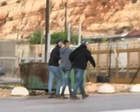
Israeli soldiers abducted, earlier Thursday, a young Palestinian man near Barta’a military roadblock, southwest of Jenin, in the northern part of the occupied West Bank.
Eyewitnesses said the soldiers, in civilian clothes, ambushed and abducted the young man, who remained unidentified at the time of this repot, near the military roadblock.
The undercover soldiers then took the young man to the soldiers at Barta’a military roadblock, before he was moved to an unknown destination.
In Ramallah, in central West Bank, the soldiers invaded a printing press in the Nahda Street, in the center of the city, and confiscated printing equipment and various posters.
Many Palestinians protested the invasion, and hurled stones at the soldiers, who fired rubber-coated steel bullets and gas bombs.
Eyewitnesses said the soldiers, in civilian clothes, ambushed and abducted the young man, who remained unidentified at the time of this repot, near the military roadblock.
The undercover soldiers then took the young man to the soldiers at Barta’a military roadblock, before he was moved to an unknown destination.
In Ramallah, in central West Bank, the soldiers invaded a printing press in the Nahda Street, in the center of the city, and confiscated printing equipment and various posters.
Many Palestinians protested the invasion, and hurled stones at the soldiers, who fired rubber-coated steel bullets and gas bombs.
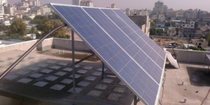
The Palestinian Energy and Natural Resources Authority confirmed, on Wednesday, that it is continuing to develop the electricity sector in Palestine, especially in the field of renewable energy, despite Israeli threats.
In a statement received by WAFA agency, the Energy Authority said it is “continuing to develop this sector despite the Israeli obstacles, and is ready to cooperate with all parties to agree on a mechanism acceptable to both parties without derogating from our rights provided by law.”
The Energy Authority rejected the practices of the so-called “Israeli Civil Administration”, the latest of which was the immediate threat of severe measurements if the Palestinian Energy Authority or private sector establish renewable energy projects in the field of energy.
The authority pointed out that energy projects are licensed by the Energy Authority on A areas of the West Bank, which fall under compete Palestinian control, after confirming the safety of the specifications of these projects to ensure that no negative impact on the network.
Therefore, the Energy Authority added that it does not find any technical justification or technical basis for the allegations made by the Civil Administration of “violation of the agreements with the Israeli side. ”
“As we seek to strengthen the efforts of the Palestinian leadership and its government to liberate the land and people from Israeli occupation on our Palestinian land by strengthening the national policy agenda for the energy sector in Palestine, which aims to create an independent energy sector and a free electric market free of dependence on the Israeli occupier, Including the transfer of powers to manage the electricity sector of the Palestinian side, according to the recent agreement signed between the two parties, but the occupying state is constantly seeking to undermine these endeavors by devoting the role of the “civil administration” and its plans for seeking to keep the principle of subordination to them, and disable all that would be the sector free from their agenda, which is far from the interests of our people,” statement concluded, according to PNN.
In a statement received by WAFA agency, the Energy Authority said it is “continuing to develop this sector despite the Israeli obstacles, and is ready to cooperate with all parties to agree on a mechanism acceptable to both parties without derogating from our rights provided by law.”
The Energy Authority rejected the practices of the so-called “Israeli Civil Administration”, the latest of which was the immediate threat of severe measurements if the Palestinian Energy Authority or private sector establish renewable energy projects in the field of energy.
The authority pointed out that energy projects are licensed by the Energy Authority on A areas of the West Bank, which fall under compete Palestinian control, after confirming the safety of the specifications of these projects to ensure that no negative impact on the network.
Therefore, the Energy Authority added that it does not find any technical justification or technical basis for the allegations made by the Civil Administration of “violation of the agreements with the Israeli side. ”
“As we seek to strengthen the efforts of the Palestinian leadership and its government to liberate the land and people from Israeli occupation on our Palestinian land by strengthening the national policy agenda for the energy sector in Palestine, which aims to create an independent energy sector and a free electric market free of dependence on the Israeli occupier, Including the transfer of powers to manage the electricity sector of the Palestinian side, according to the recent agreement signed between the two parties, but the occupying state is constantly seeking to undermine these endeavors by devoting the role of the “civil administration” and its plans for seeking to keep the principle of subordination to them, and disable all that would be the sector free from their agenda, which is far from the interests of our people,” statement concluded, according to PNN.
4 dec 2018
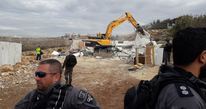
Israeli bulldozers demolished on Tuesday a number of Palestinian facilities in Beit Hanin, Jabal Mukabber, and Sur Barhir in occupied Jerusalem.
Local sources said that Israeli forces along with bulldozers stormed Beit Hanin town and demolished a commercial facility after confiscating building materials.
The Israeli bulldozers carried out the demolition for being allegedly built without permit.
At the same time, a large unit of Israeli police stormed Jabal Mukabber neighborhood and cordoned off a house under construction before bulldozers demolished the house under the pretext of being built without a rarely-issued Israeli license.
Police reportedly restricted Palestinian movement in the area and assaulted Palestinians who attempted to fight back against bulldozers.
Also in occupied Jerusalem, Israeli bulldozers demolished a newly built house in Sur Bahir town for being allegedly built without Israeli permit.
Earlier Sunday, Israeli authorities forced a Palestinian family to demolish newly-built premises at their house in Jerusalem’s Silwan town, south of al-Aqsa Mosque.
Using the pretext of illegal building, Israel demolishes Palestinian houses on a regular basis to restrict Palestinian expansion in occupied Jerusalem.
Local sources said that Israeli forces along with bulldozers stormed Beit Hanin town and demolished a commercial facility after confiscating building materials.
The Israeli bulldozers carried out the demolition for being allegedly built without permit.
At the same time, a large unit of Israeli police stormed Jabal Mukabber neighborhood and cordoned off a house under construction before bulldozers demolished the house under the pretext of being built without a rarely-issued Israeli license.
Police reportedly restricted Palestinian movement in the area and assaulted Palestinians who attempted to fight back against bulldozers.
Also in occupied Jerusalem, Israeli bulldozers demolished a newly built house in Sur Bahir town for being allegedly built without Israeli permit.
Earlier Sunday, Israeli authorities forced a Palestinian family to demolish newly-built premises at their house in Jerusalem’s Silwan town, south of al-Aqsa Mosque.
Using the pretext of illegal building, Israel demolishes Palestinian houses on a regular basis to restrict Palestinian expansion in occupied Jerusalem.
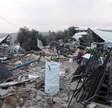
Israeli soldiers invaded, on Tuesday morning, the western area of Hares village, west of the central West Bank city of Salfit, and demolished five agricultural and commercial structures.
Resident Mohammad Suleiman said dozens of soldiers invaded the village at dawn, before using their armored military bulldozers in demolishing the five commercial structures, owned by his brothers.
He added that the demolished structures are owned by his brothers Fadi, Nadi and Saleh Suleiman, and that the army claimed they were built without a permit from the Israeli Civil Administration Office, as they are located in Area C, under full Israeli control, in the occupied West Bank.
The demolished structures were an agricultural hothouse, a laundromat, a carpentry, a blacksmith and aluminum workshops.
Mohammad added that Israel issued the demolition orders just a week ago, informing his brothers that they “have one month to file appeals,” however, the soldiers demolished the properties within seven days.
Resident Mohammad Suleiman said dozens of soldiers invaded the village at dawn, before using their armored military bulldozers in demolishing the five commercial structures, owned by his brothers.
He added that the demolished structures are owned by his brothers Fadi, Nadi and Saleh Suleiman, and that the army claimed they were built without a permit from the Israeli Civil Administration Office, as they are located in Area C, under full Israeli control, in the occupied West Bank.
The demolished structures were an agricultural hothouse, a laundromat, a carpentry, a blacksmith and aluminum workshops.
Mohammad added that Israel issued the demolition orders just a week ago, informing his brothers that they “have one month to file appeals,” however, the soldiers demolished the properties within seven days.
3 dec 2018
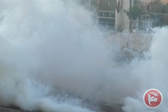
Dozens of Palestinians suffered tear-gas suffocation, on Monday evening, as Israeli forces raided the Beit Ummar town in northern Hebron in the southern occupied West Bank.
Activist Muhammad Ayyad Awad said that Israeli soldiers forces shop owners to close their shops and searched ID cards of Palestinians in the area.
Israeli forces also sealed off the main street in the town, preventing movement by pedestrians and vehicles.
Awad added that Israeli forces distributed flyers warning people of throwing rocks and Molotov cocktails at Israeli settlers' vehicles and buses crossing by the entrance of Beit Ummar.
Israeli soldiers fired tear-gas bombs, stun grenades and rubber-coated steel bullets as clashes erupted with locals.
Activist Muhammad Ayyad Awad said that Israeli soldiers forces shop owners to close their shops and searched ID cards of Palestinians in the area.
Israeli forces also sealed off the main street in the town, preventing movement by pedestrians and vehicles.
Awad added that Israeli forces distributed flyers warning people of throwing rocks and Molotov cocktails at Israeli settlers' vehicles and buses crossing by the entrance of Beit Ummar.
Israeli soldiers fired tear-gas bombs, stun grenades and rubber-coated steel bullets as clashes erupted with locals.
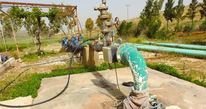
At the entrances of Nablus governorate to the north-west, the towns of Deir Sharaf, Barqa and Bazaria, suffer from the scarcity of water, despite the fact that they live on a large water basin, while the nearby settlement of Shavei Shomron enjoys large amounts of water round the clock.
The residents of these towns, which number more than 40,000, are distressed and thirsty, while 1,200 settlers consume water twice as much they do.
Palestinians’ plantations die because of the lack of water in the summer, and the trees of Shavei Shomron settlement rise up in the sky due to abundant amounts of water.
Water guaranteed for settlers
Dirar Abu Omar, the Director of the Agricultural Relief Society in Nablus and the former deputy mayor of Barqa village for four years, said that the Israelis control the water basin in the settlement of Shomron, which gets its water from the water-well of the Palestinian neighboring village of Beit Iba. When the water level goes down to less than two meters, settlers get water around the clock.
He added that anyone observing the trees inside the Israeli military post and the settlement of Shomron, could see the size of the trees, which are no more than ten years old. The trees of the villages of Naqoura and Deir Sharaf, which are 60 years old, do not reach half of their size due to the lack of water.
The suffering in summer
The head of the council of Deir Sharaf village, Fahmi Nofal, confirms that only a street separates his town from the Israeli settlement. In the summer, the town suffers from lack of drinking water, and people are forced to buy water through tanks or to bring water from a water spring in the town.
Farmer Abdullah Antari says that dozens of dunums planted with citrus have dried up or decreased their produce due to the lack of water, after the village was known for orange and lemon produce, which was profitable for farmers, pointing out that one of the workers from the town at the settlement of Shomron has noticed the existence of swimming pools in the majority of the houses of the settlement, as well as pipes for watering plantations around the clock.
According to Mahmoud Saifi, the Director of the Land Research Center in Nablus, the Israeli occupation controls the Palestinian resources, including water, as well as the drilling of water-wells and the quantities of water allowed to be pumped, based on the Oslo Accords, without heeding the needs of the citizens for drinking water and for irrigating crops.
Israeli control
He added that the villages north-west of Nablus is an example of this, despite the presence of plenty of water under their land, and the passage of water lines in front of their homes.
According to the Palestinian Central Bureau of Statistics, the Israeli occupation controls 85% of the water flowing from the aquifers, forcing the Palestinians to purchase water from the Israeli water company Mekorot; the amount of water purchased amounted to 63.5 million m3.
The Israeli occupation also controls most of the renewable water resources in Palestine, amounting to about 750 million m3 annually, while the Palestinians receive only about 110 million m3 of the available resources.
The Palestinian share of the aquifers according to the Oslo Accords is 118 million m3. This quantity was supposed to become 200 million m3 by the year 2000, if the Oslo Accords were implemented.
According to Engineer Mazen Ghoneim, the Head of the Water Authority in Palestine, the daily ration of water of Israeli settlers is from 400 to 800 liters, compared to 45-50 liters for the Palestinians.
The residents of these towns, which number more than 40,000, are distressed and thirsty, while 1,200 settlers consume water twice as much they do.
Palestinians’ plantations die because of the lack of water in the summer, and the trees of Shavei Shomron settlement rise up in the sky due to abundant amounts of water.
Water guaranteed for settlers
Dirar Abu Omar, the Director of the Agricultural Relief Society in Nablus and the former deputy mayor of Barqa village for four years, said that the Israelis control the water basin in the settlement of Shomron, which gets its water from the water-well of the Palestinian neighboring village of Beit Iba. When the water level goes down to less than two meters, settlers get water around the clock.
He added that anyone observing the trees inside the Israeli military post and the settlement of Shomron, could see the size of the trees, which are no more than ten years old. The trees of the villages of Naqoura and Deir Sharaf, which are 60 years old, do not reach half of their size due to the lack of water.
The suffering in summer
The head of the council of Deir Sharaf village, Fahmi Nofal, confirms that only a street separates his town from the Israeli settlement. In the summer, the town suffers from lack of drinking water, and people are forced to buy water through tanks or to bring water from a water spring in the town.
Farmer Abdullah Antari says that dozens of dunums planted with citrus have dried up or decreased their produce due to the lack of water, after the village was known for orange and lemon produce, which was profitable for farmers, pointing out that one of the workers from the town at the settlement of Shomron has noticed the existence of swimming pools in the majority of the houses of the settlement, as well as pipes for watering plantations around the clock.
According to Mahmoud Saifi, the Director of the Land Research Center in Nablus, the Israeli occupation controls the Palestinian resources, including water, as well as the drilling of water-wells and the quantities of water allowed to be pumped, based on the Oslo Accords, without heeding the needs of the citizens for drinking water and for irrigating crops.
Israeli control
He added that the villages north-west of Nablus is an example of this, despite the presence of plenty of water under their land, and the passage of water lines in front of their homes.
According to the Palestinian Central Bureau of Statistics, the Israeli occupation controls 85% of the water flowing from the aquifers, forcing the Palestinians to purchase water from the Israeli water company Mekorot; the amount of water purchased amounted to 63.5 million m3.
The Israeli occupation also controls most of the renewable water resources in Palestine, amounting to about 750 million m3 annually, while the Palestinians receive only about 110 million m3 of the available resources.
The Palestinian share of the aquifers according to the Oslo Accords is 118 million m3. This quantity was supposed to become 200 million m3 by the year 2000, if the Oslo Accords were implemented.
According to Engineer Mazen Ghoneim, the Head of the Water Authority in Palestine, the daily ration of water of Israeli settlers is from 400 to 800 liters, compared to 45-50 liters for the Palestinians.
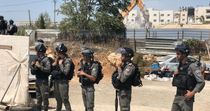
The Israeli occupation forces on Monday demolished Palestinian houses and sheep brans in the northern Jordan Valley.
Anti-settlement activist Aref Daraghmeh said in press statements that large Israeli forces stormed Fasayel village and demolished residential facilities and sheep barns owned by Bedouin families there.
Daraghmeh added that the Israeli forces raided a number of Palestinian houses in the same area on Sunday evening and seized about 50,000 NIS.
Anti-settlement activist Aref Daraghmeh said in press statements that large Israeli forces stormed Fasayel village and demolished residential facilities and sheep barns owned by Bedouin families there.
Daraghmeh added that the Israeli forces raided a number of Palestinian houses in the same area on Sunday evening and seized about 50,000 NIS.
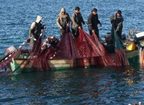
Several armored Israeli military vehicles invaded, on Monday morning, Palestinian lands in the eastern area of the central part of the Gaza Strip.
Media sources have reported that the vehicles, accompanied by four armored military bulldozers, carried out a limited invasion into the Palestinian farmlands in the area east of the al-Maghazi refugee camp.
They added that the bulldozers uprooted lands near the perimeter fence, and installed sand hills, while military drones hovered overhead.
In related news, Israeli navy ships fired several live rounds at Palestinian fishing boats, in northern Gaza waters.
Media sources have reported that the vehicles, accompanied by four armored military bulldozers, carried out a limited invasion into the Palestinian farmlands in the area east of the al-Maghazi refugee camp.
They added that the bulldozers uprooted lands near the perimeter fence, and installed sand hills, while military drones hovered overhead.
In related news, Israeli navy ships fired several live rounds at Palestinian fishing boats, in northern Gaza waters.
Page: 43 - 42 - 41 - 40 - 39 - 38 - 37 - 36 - 35 - 34 - 33 - 32 - 31 - 30 - 29 - 28 - 27 - 26 - 25 - 24 - 23 - 22
